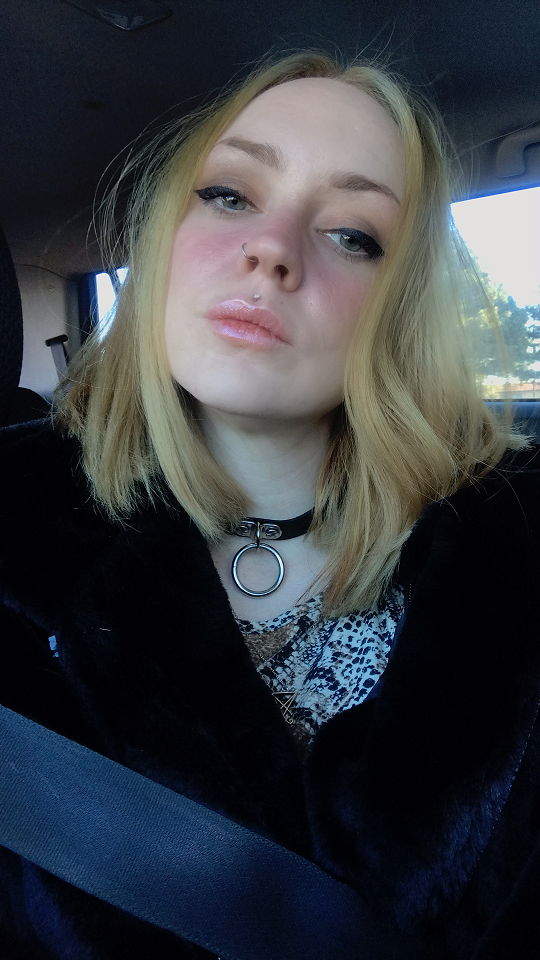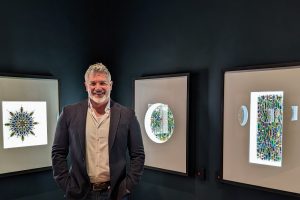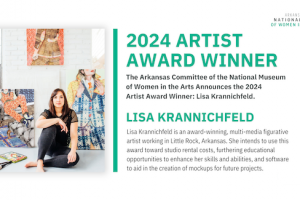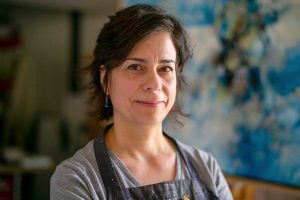STRIPPED BARE

Elle Nash’s raw, unrelenting tales found in her short story collection, Nudes, leaves its mark on the reader.
INTERVIEW / KODY FORD
Elle Nash is releasing her first short story collection, Nudes, this spring by Short Flight/Long Drive Books. Its raw contents illustrate Nash’s goal to be self-aware and self-indulgent—as she says, what is more self-indulgent than a nude? In 2018, Nash released her debut novel Animals Eat Each Other with Dzanc Books. A visceral and, at times, erotic look at obsession and sexuality, the book tells the story of a young bisexual woman in Colorado who enters into a relationship with a polyamorous couple. A darker take on a coming of age story, Animals was featured in the 2018 June Reading Room of O, The Oprah Magazine and hailed by Publishers Weekly as a “complex, impressive exploration of obsession and desire.” Elle’s short stories and essays appear in Guernica, The Nervous Breakdown, Literary Hub, The Fanzine, Volume 1 Brooklyn, New York Tyrant and elsewhere. She is a founding editor of Witch Craft Magazine and a fiction editor at Hobart Pulp. She also teaches a fiction workshop called Textures. We talked with Nash about her new collection, writing and teaching via Discord.
How long has this collection been in the works?
I started pulling together stories right after my first novel came out, just to see what I had. I’d written my chapbook, AVOKA, inspired by some early experiences of my first couple months living in Northwest Arkansas, actually. So I expanded and rewrote a lot of those stories, and then added more in, spent the next few years working on others, reworking old ones I’d never felt satisfied with. Some of the stories go back to my first published pieces, back in 2014 or so.
How many would you estimate have been published prior?
Probably about half.
What are some notable journals some of these stories appeared in?
Guernica is probably the most notable one!
So the structure of this book is broken down into types of porn. What inspired this?
When I first envisioned this collection, I felt inspired by Kim Kardashian West’s book Selfish. It’s literally just a book of selfies. I love the interplay of giving an audience what they want and also pissing them off at the same time. It’s apparent in the title—Selfish—that she, as the author of it, is fully aware of what people think of this collection, its vapidity. And yet she knows people will still pick up the book. On a surface level it looks superficial, but because it gets people talking, it’s really not superficial at all. It’s begging a question. I appreciate that kind of attitude.
When I imagined Nudes, that was how I felt. My work has been critiqued as self-indulgent, with an erotic flair. It’s been rejected on the grounds of featuring too much teenage drug use or sex. And so I just thought, run in that direction. I wanted to play on themes of obscenity (where obscenity/pornography is defined as content with nothing to give society except titillation). I picked categories I either liked or that I thought would be funny, and tried to fit each of the stories in there. I wanted it to be self-aware and self-indulgent, like, what is more self-indulgent than a nude?
You mentioned that people have said you’re self-indulgent. I think writing in first person opens anyone up to that to a point. Why’s your story so important? One thing we’ve noticed about your work and can’t think of the best way to describe it, is that there’s a detachment to it in a way. It’s like being on too many antidepressants and you’re seeing life happening and you’re a part of the action, but it kinda feels like you’re an observer. Does this make any sense?
Yes. I always want to write my characters with as little judgment as possible. I refrain from spoon-feeding readers and have very little to say about morality in my art. I want the reader to make those decisions for themselves. Especially in first person. It’s something I hear people comment on a lot in my work, that the characters are detached—whether for good or ill. On the good side of it, I’ve heard people say all kinds of things—they mirror themselves into the characters, which I think is wonderful. On the bad side of it, readers who expect a lot, they tend to feel dissatisfied.
How did you get into writing exactly?
I don’t remember really when it started. I began journaling online, for example, as early as 13 years old […] in Livejournal days. I would write poetry and read poetry of girls my age, and there was even like, a kind of webring (does anyone remember those?) of online poetry journals I used to be a part of. Like in the days of guest books, when you could still customize your sites with your own HTML, that kind of thing. And every day after school I’d come home and write a poem. I’d journal my life, too, as a way to just get it off my chest. I took creative writing classes in high school, and my parents convinced me to follow a career path that made money. So I went into journalism, thinking that would be the way I could do both. I didn’t start taking fiction writing seriously until years later, years after college, when I was just really unsatisfied with where I was at in my life. I wanted to learn how to do it—how to stop writing so journalistically, and make art. That was kind of a pathway back to my young creative self.
Were there any books or writers that served as a catalyst to make you want to do that?
The first author that really made me want to write was Chuck Palahniuk. His early work (Diary, for example) still, to me, has a kind of gritty wildness to it that I’ll always admire. And Invisible Monsters has so much good pain in it. That was how I found out about Tom Spanbauer. I wanted to know how Chuck learned to write, too, and that was where I learned about Tom’s Dangerous Writing workshop in Portland. Tom’s work is more than devastating. I remember sobbing through the last 40 pages of his last novel, I Loved You More. They both embodied this kind of shameless attitude toward writing that for my younger self, really needed to embrace in order to be successful. I needed to learn how to run into the fire. Tom specifically taught me that. And I find that writers I gravitate toward now, tend to be the ones that embody that spirit, too.
I need to know what’s at stake, in a work. I want the work to feel real, like there’s a real person ready to lose something by sharing their story. Even if there is no real person there because it’s a trick of the author—an effigy. A tulpa. That’s what inspires me, I guess.
What other important lessons did Tom teach you?
Balance. How to unpack the details of a work. And how it’s the details, the visceralness, of the moment, that actually brings a reader to their knees. It’s not metaphor, usually, that does its trick. It’s the way a moment is created inside the mind, the weight of it, which is being manipulated by very specific detail, that does it. Removing vagaries, rooting out laziness. That all contributes to a piece.
At what point did you decide to start teaching?
I had the director of classes at LitReactor reach out to me to teach a class when [Animals Eat Each Other] came out, and I have a hard time saying no to opportunities. I figured it would be a fun and unique challenge. So I said yes and put together a class on metaphor, and did a bunch of research, basically teaching myself, grad level ideas on what metaphor was and why it’s used and why it works and what doesn’t work.
After a while, though, I wanted to break off on my own. I wanted to make something that felt more conversational than a class, so I started Textures in 2020. I feel like I learn as much as my students do.
What have been some challenges you’ve overcome while developing these classes?
I’ve had to figure out how to say out loud what I already know to be true in my head. Like, I can read something, and get a feeling for when something about it isn’t working. But in the workshop I then have to articulate why and offer solutions. It’s not enough to just say “this isn’t working.” In order to understand, and to improve, you have to go deeper in your head and be like, “OK, but why isn’t it working?”
You mentioned that you learn as much as your students do. Any examples?
I just believe that the process of editing others’ work teaches you a lot about your own work. What your tastes are, why you hate or love something, how to avoid pitfalls that you see in others’ work helps you see it better in your own. And so it’s like a synergistic process. You just learn a lot about yourself.
How do you select different topics to lecture on each month?
I try to teach some level of a basic element—plot, dialogue, character, etc.—then I pair it with a reading. And with the reading, I try to go beyond the basic element, as well, since there are just so many ways one can talk elements of fiction in that sense.
What are some of the main differences you’ve found between writing a novel compared to a short story?
Short stories have a better pay off sometimes because they take less time to write and publish. Also, I think in a short story, there’s less room for error. If you start a thread and don’t pick it up again, people are going to notice that a lot more than in a novel. Every scene needs to be there for a reason.
Do you feel you can explore similar topics and emotions better in one form or the other?
That’s really hard to say. I think you can be explosive with feeling in either form—it kind of depends more on how it’s being written. Like, the voice of it. Though in a novel it is more of a challenge to carry voice through an entire piece simply because it’s longer.
What are some ways you maintain consistency with your writing output?
I maintain output a couple of ways. The first is realizing that output has to build momentum. So for example you can’t just get up one day and run a marathon. You kind of have to work your way up to it. Once you build the momentum (say, you get used to getting up and writing for an hour or two every day), you have to maintain discipline. Discipline requires being adaptable, though. If something is too rigid, it will break. So you have to learn to be flexible with your schedule. If, for example, there’s a day that you can’t or don’t write, or you don’t meet your time/word goal, you can’t be too hard on yourself about it or those negative feelings will impede your ability to keep going. It’ll create a shame spiral. You just have to let it go and resolve to do it again the next day. And you have to keep going with that mindset, every day, for as long as you want to maintain that momentum.
What are you working on now?
After I finished two full lengths and a novella last year, I am taking a break. I have been writing a bit of poetry here and there. But for now I’m just reading. Trying to rest my mind.
Did you find you became more productive after moving to Colorado?
Not necessarily! I definitely became more productive after having a kid though. Because time became so precious, I tried really hard not to waste it. Maybe though writing became a bit of an escape during the pandemic.
// ELLENASH.NET
// TWITTER @SADEROTICA





Comments